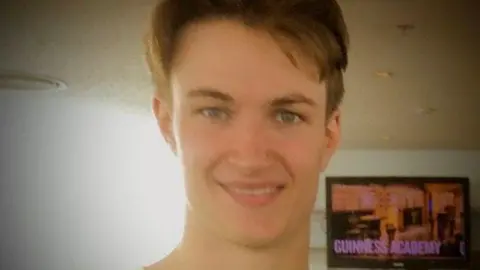Jury in swimmer death trial hears lifeguard police statements
 Teresa and Malachy Rogers
Teresa and Malachy RogersThe trial of three lifeguards charged over the death of swimmer Christopher Rogers has heard statements made by each of the defendants to the police and health and safety investigators.
Mr Rogers, 20, died at the Orchard Leisure Centre in Armagh in 2017.
Cathal Peter Forrest McVeigh, 35, of Dunamony Road in Dungannon, James Monaghan, 26, of Folly Lane in Armagh and William Holden, 26, of Unshinagh Lane in Portadown were on duty the night he died.
They each face a single count that being employees, they were in breach of their duty to others in that they "failed to take reasonable care for the health and safety of other persons who may be affected by your acts or omissions at work".
Newry Crown Court previously heard that on the day of his death Mr Rogers had been swimming underwater for about a minute before breaking the water's surface.
He then descended to the bottom of the pool and lay there for five minutes and 14 seconds before a rescue attempt was made.
He was later pronounced dead. A coroner said he had lost consciousness due to a lack of oxygen.
The jury heard transcripts of interviews the police and the Health and Safety Executive for Northern Ireland (HSENI) conducted with each of the defendants two years after the incident.
'Concerned he was holding breath'
Mr McVeigh's interviews were the first to be read by Kevin Campbell, a senior investigator with the HSENI.
The jury heard that, on legal advice, he refused to answer police questions, referring them instead to a detailed statement he made a few weeks after Mr Rogers died.
That statement was read into the record by the interviewing officers, and the jury heard how Mr McVeigh outlined that he was aware of Mr Rogers holding his breath and swimming lengths underwater.
The lifeguard said that due to glare on the water surface, he moved to get a better view and then could see Mr Rogers on the bottom of the pool who "seemed to be conscious and he was moving - sitting up and lying down".
He said that a member of the public checked Mr Rogers and, after this, he "and other staff still had no concerns - we believed him to be holding his breath as previous".
In his statement, Mr McVeigh recounted that after he banged on the metal steps with a reach pole, "a member of the public grabbed his arm and came up and I noticed there was no reaction from Christopher".
"I would like to clarify that when I stated that Christopher Rogers was under the water we did not believe that he was in any danger but that we were concerned that he had been holding his breath for a pretty long time," the statement read.
'Ran over and hit the alarm'
Mr Holden had been on duty in the high chair - he told police and the HSENI that when his colleague came on duty to relieve him, even though he knew Mr Rogers' usual swimming and training habits, he "wanted him to come up from the bottom".
"At that point there was no real concern - I just wanted him up from the bottom of the pool because obviously, there was a switch over," Mr Holden said.
He added that he "didn't really think there was anything wrong but when he was pulled up out of the water" he "ran over and hit the alarm".
He told investigators that although he could not remember whether his training had addressed or included hypoxic training, "it was definitely addressed after the incident" with advice posters put up in leisure centres and "a rule that you are not allowed to do more than 20 meters underwater".
Mr Holden said during his recorded interviews that Mr Rogers "wasn't a stranger to the pool" and he told the investigators "if it had been somebody else, we would have taken action straight away… definitely".
'Just keeping a watch'
Mr Monaghan told investigators "it wasn't like a random person in the pool - we knew of him and we knew that he done the type of training that he did… we were just keeping a watch".
He had been at the poolside and, around the time that Mr Rogers started his underwater lengths, Mr McVeigh had come on duty to relieve him.
Mr Monaghan told police and the HSENI that part of their conversation was about Mr Rogers but "there was no cause for concern whatsoever".
The lifeguard said the conversation was along the lines of "Chris is in swimming - just keep a watch", after which he went to the changing area and when he came back, Mr Rogers was still submerged.
Like his colleagues, Mr Monaghan also agreed there was "nothing in the training about how long people should stay underwater… or about hypoxic training".
"At no point did I think that it was not OK," Mr Monaghan said in his interviews, explaining that "if it was any other swimmer on the bottom of the pool for, say like 30 seconds, we would get in and get him out".
"If it was someone diving in the shallow end and I watched them do it and didn't say anything and they did it again and hurt their spine, then I'm in breach of my duty of care but I didn't know to tell him," Mr Monaghan said.
The trial continues.
